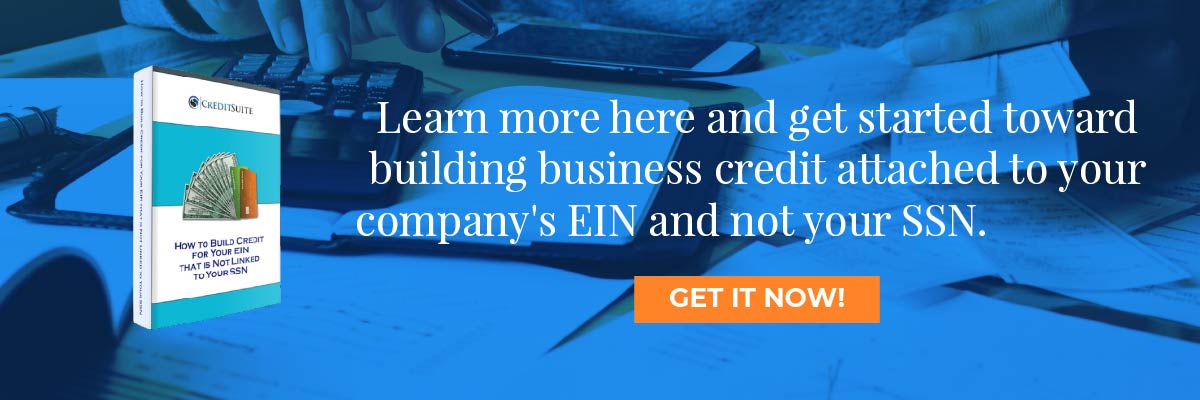- Connect With Us!
- (877) 600-2487
- info@creditsuite.com
How to Set Up a New Business in Washington State
Published By Janet Gershen-Siegel at May 19th, 2019
Starting a Business in Washington State
A new business in Washington State is not out of reach. So have you been wondering: how do I start a new business in Washington State? And more importantly, can I do so no matter what the economic conditions are? Can I start a new business in Washington State during a recession?
New Business in Washington State: Pros and Cons
Business Insider puts Washington in its top twenty states when it comes to starting a new business, according to a 2016 article. But beware: this state has the lowest business survival rate. But it also has the fourth highest percentage of available employees.
Recent Upswing
But per a 2018 article by Forbes, Washington State clocked in at a more impressive number nine. Now, keep in mind, Forbes and Business Insider use differing methodologies.
Why the change? Per Forbes, Washington ranks highly for growth prospects, labor supply, and economic climate. But the regulatory environment and the quality of life (most likely due to the higher cost of living) rank at the lower middle of the pack.
Start a New Business in Washington State – Washington State Top Industries
Per the Washington State Department of Commerce, the biggest industries in Washington State are agriculture and food manufacturing. More top Washington State industries are aerospace, forest products, and also clean technology. Yet more Washington State top industries are life science, global health, and health care and social assistance. More top industries in Washington State are maritime, and information and communications technology. And finally Washington State is also famous for military and defense.
Start a New Business in Washington State – Washington State Business Ideas
Smart business owners can find new opportunities. Work with the bigger industries in the state. Offer goods or services such as food services and hospitality. Another idea is trucking for any industry. More ideas are computer support in the form of programming or data. Another idea is also the development and distribution of safety equipment.
Here is how to start a new business in Washington State.
Start a New Business in Washington State – Washington New Business Secretary of State Requirements
Register a Business Name
Filing for a trade name allows a business owner to create a business name that does not feature their personal name. Or in the case of a limited partnership or corporation, it’s not the name of the company as has been registered with the Secretary of State. Before filing for a trade name, a business owner must ensure the availability of the chosen name. Anyone can perform this search at the Business Licensing Service’s search webpage.
For more information regarding trade names, visit this FAQ guide to trade name registration.
Corporations
Washington State corporation names must be unique. Business owners should check if a name is in use by another registered corporation in Washington. Search online records and other registers and catalogs to determine that a name t is available. There is a database of registered Washington corporations on the Washington State Secretary of State website.
Corporate Name Reservations
It is not required to reserve a name before filing to incorporate in Washington State. If a business owner wants to reserve a name before they file to incorporate, they can submit a name reservation application to the office of the Washington Secretary of State.
The application for corporate name reservation is available at Reserve a Washington Corporation Name on the Washington State Secretary of State website. The corporate name will then be reserved for a period of 180 days. There is a filing fee of $30.00 when submitting a name reservation application.
Business Permits and Licenses
The Business Licensing Service is a one stop location for all your licensing needs. In particular, be sure to check out the Business License Application page.
Local Permits and Licenses
Go to the Business Licensing Service page for a list of cities – and the licenses they require.
Start a New Business in Washington State – Business Registration
Look for the “Start a Business” section on the Corporations page on the Secretary of State website.
Tax Registration
Go to the dedicated “Register my Business” page on the Department of Revenue website.
Start a New Business in Washington State – Virtual Offices
Alliance offers Washington virtual business office space in the following cities. For Eastern Washington State, Alliance has space in Spokane. For Western Washington State, there is office space in Bellevue, Bothell, Issaquah, Seattle and also Tacoma.
So go to Regus for Olympia. Use DaVinci for Washington State virtual business space in Vancouver. However, for Kennewick and Yakima, and for other parts of the state, try local business owners. Also ask computer user groups for help in this area. Other options may be virtual business office space in nearby states. These are Idaho to the west and also Oregon to the south.
Start a New Business in Washington State – Build Business Credit
Business credit is credit in a small business’s name. It doesn’t connect to an owner’s individual credit, not even when the owner is a sole proprietor and the sole employee of the company.
Hence, an entrepreneur’s business and personal credit scores can be very different.
The Benefits
Due to the fact that business credit is distinct from consumer, it helps to secure a business owner’s personal assets, in the event of court action or business bankruptcy.
Also, with two separate credit scores, a business owner can get two separate cards from the same vendor. This effectively doubles buying power.
Another advantage is that even startups can do this. Visiting a bank for a business loan can be a formula for frustration. But building small business credit, when done right, is a plan for success.
Personal credit scores depend on payments but also other considerations like credit usage percentages.
But for business credit, the scores really merely depend on if a company pays its invoices promptly.
Learn more here and get started toward building business credit attached to your company’s EIN and not your SSN.
The Process
Establishing company credit is a process, and it does not happen without effort. A small business has to actively work to build business credit.
Nevertheless, it can be done easily and quickly, and it is much swifter than building personal credit scores.
Merchants are a big part of this process.
Doing the steps out of sequence will result in repetitive rejections. Nobody can start at the top with company credit. For example, you can’t start with retail or cash credit from your bank. If you do, you’ll get a denial 100% of the time.
Start a New Business in Washington State – Small Business Fundability
A business must be fundable to lenders and vendors.
Due to this fact, a company will need a professional-looking website and email address. And it needs to have site hosting bought from a company such as GoDaddy.
Plus, company phone and fax numbers should have a listing on ListYourself.net.
At the same time, the business phone number should be toll-free (800 exchange or the equivalent).
A company will also need a bank account dedicated strictly to it, and it has to have every one of the licenses essential for running.
Learn more here and get started toward building business credit attached to your company’s EIN and not your SSN.
Working with the Internal Revenue Service
Visit the Internal Revenue Service website and get an EIN for the company. They’re free. Choose a business entity like corporation, LLC, etc.
A company can get started as a sole proprietor. But they will most likely wish to switch to a variety of corporation or an LLC.
This is in order to diminish risk. And it will optimize tax benefits.
A business entity will matter when it pertains to tax obligations and liability in the event of litigation. A sole proprietorship means the entrepreneur is it when it comes to liability and taxes. Nobody else is responsible.
Sole Proprietors Take Note
If you run a company as a sole proprietor, then at least be sure to file for a DBA. This is ‘doing business as’ status.
If you do not, then your personal name is the same as the business name. Hence, you can find yourself being personally liable for all company financial obligations.
Additionally, according to the Internal Revenue Service, using this structure there is a 1 in 7 chance of an IRS audit. There is a 1 in 50 possibility for corporations! Steer clear of confusion and substantially decrease the odds of an IRS audit simultaneously.
Kicking Off the Business Credit Reporting Process
Begin at the D&B website and obtain a totally free D-U-N-S number. A D-U-N-S number is how D&B gets a company in their system, to produce a PAYDEX score. If there is no D-U-N-S number, then there is no record and no PAYDEX score.
Once in D&B’s system, search Equifax and Experian’s web sites for the company. You can do this at fastcs.wpengine.com/reports. If there is a record with them, check it for accuracy and completeness. If there are no records with them, go to the next step in the process.
In this manner, Experian and Equifax will have something to report on.
Vendor Credit Tier
First you must establish trade lines that report. This is also referred to as the vendor credit tier. Then you’ll have an established credit profile, and you’ll get a business credit score.
And with an established business credit profile and score you can begin to get credit in the retail and cash credit tiers.
These kinds of accounts have the tendency to be for the things bought all the time, like marketing materials, shipping boxes, outdoor work wear, ink and toner, and office furniture.
But to start with, what is trade credit? These trade lines are credit issuers who will give you preliminary credit when you have none now. Terms are in most cases Net 30, rather than revolving.
So, if you get approval for $1,000 in vendor credit and use all of it, you will need to pay that money back in a set term, like within 30 days on a Net 30 account.
Details
Net 30 accounts must be paid in full within 30 days. 60 accounts have to be paid completely within 60 days. In contrast to with revolving accounts, you have a set time when you have to pay back what you borrowed or the credit you used.
To begin your business credit profile the proper way, you ought to get approval for vendor accounts that report to the business credit reporting agencies. As soon as that’s done, you can then use the credit.
Then repay what you used, and the account is on report to Dun & Bradstreet, Experian, or Equifax.
Vendor Credit Tier – It Helps
Not every vendor can help in the same way true starter credit can. These are vendors that will grant an approval with negligible effort. You also need them to be reporting to one or more of the big three CRAs: Dun & Bradstreet, Equifax, and Experian.
You want 5 to 8 of these to move onto the next step, which is the retail credit tier. But you may need to apply more than one time to these vendors. So, this is to prove you are responsible and will pay promptly.
Retail Credit Tier
Once there are 5 to 8 or more vendor trade accounts reporting to at least one of the CRAs, then move onto the retail credit tier. These are service providers like Office Depot and Staples.
Only use your SSN and date of birth on these applications for verification purposes. For credit checks and guarantees, use the company’s EIN on these credit applications.
One example is Lowe’s. They report to D&B, Equifax and Business Experian. They need to see a D-U-N-S and a PAYDEX score of 78 or more.
Fleet Credit Tier
Are there 8 to 10 accounts reporting? Then progress to the fleet credit tier. These are businesses such as BP and Conoco. Use this credit to buy fuel, and to fix, and maintain vehicles. Only use your SSN and date of birth on these applications for verification purposes. For credit checks and guarantees, make sure to apply using the small business’s EIN.
One such example is Shell. They report to D&B and Business Experian. They need to see a PAYDEX Score of 78 or better and a 411 company telephone listing.
Shell might claim they want a particular amount of time in business or revenue. But if you already have enough vendor accounts, that won’t be necessary. And you can still get an approval.
Learn more here and get started toward building business credit attached to your company’s EIN and not your SSN.
Cash Credit Tier
Have you been sensibly managing the credit you’ve up to this point? Then move onto the cash credit tier. These are companies such as Visa and MasterCard. Only use your Social Security Number and date of birth on these applications for verification purposes. For credit checks and guarantees, use your EIN instead.
One such example is the Fuelman MasterCard. They report to D&B and Equifax Business. They need to see a PAYDEX Score of 78 or higher. And they also want you to have 10 trade lines reporting on your D&B report.
Plus, they want to see a $10,000 high credit limit reporting on your D&B report (other account reporting).
In addition, they want you to have an established company.
These are service providers like Walmart and Dell, and also Home Depot, BP, and Racetrac. These are often MasterCard credit cards. If you have 14 trade accounts reporting, then these are attainable.
Monitor Your Business Credit
Know what is happening with your credit. Make sure it is being reported and address any inaccuracies ASAP. Get in the practice of checking credit reports and digging into the specifics, and not just the scores.
We can help you monitor business credit at Experian and D&B for only $24/month. See: fastcs.wpengine.com/monitoring.
Update Your Data
Update the information if there are mistakes or the details is incomplete.
Fix Your Business Credit
So, what’s all this monitoring for? It’s to dispute any mistakes in your records. Mistakes in your credit report(s) can be taken care of. But the CRAs often want you to dispute in a particular way.
Disputes
Disputing credit report inaccuracies usually means you mail a paper letter with duplicates of any proofs of payment with it. These are documents like receipts and cancelled checks. Never mail the original copies. Always mail copies and retain the original copies.
Fixing credit report mistakes also means you precisely itemize any charges you dispute. Make your dispute letter as crystal clear as possible. Be specific about the problems with your report. Use certified mail so that you will have proof that you mailed in your dispute.
A Word about Building Business Credit
Always use credit sensibly! Don’t borrow more than what you can pay back. Monitor balances and deadlines for payments. Paying on time and fully will do more to elevate business credit scores than nearly anything else.
Growing business credit pays off. Great business credit scores help a company get loans. Your lending institution knows the business can pay its financial obligations. They know the business is bona fide.
The business’s EIN attaches to high scores and lending institutions won’t feel the need to ask for a personal guarantee.
Business credit is an asset which can help your business in years to come.
Learn more here and get started toward opening a new business in Washington State.
Want to start a new business someplace else in America? Then check out our handy guide to starting a business in any state in the country.
Washington State’s Response to COVID-19
Here’s what Washington State is doing about COVID-19. By March 18, Governor Jay Inslee’s office had compiled a partial list of resources to support economic retention and recovery related to COVID-19 coronavirus. The Washington State Department of Revenue (DOR) can work with impacted companies that request an extension on tax filing.
The Washington State Department of Commerce’s Export Assistance Team division can help companies identify alternative markets and provide firms with STEP Vouchers. These are to defray the costs of trade show or trade mission fees, airfare, interpreter and translation services, business matchmaking, export training programs and more.
See: governor.wa.gov/issues/issues/covid-19-resources/covid-19-resources-businesses-and-workers

 " class="attachment-blog-single size-blog-single wp-post-image" alt="Get Business Credit Cards for New Businesses Credit Suite-Business Line of Credit Decoded" title="Get Business Credit Cards for New Businesses">>
" class="attachment-blog-single size-blog-single wp-post-image" alt="Get Business Credit Cards for New Businesses Credit Suite-Business Line of Credit Decoded" title="Get Business Credit Cards for New Businesses">>
